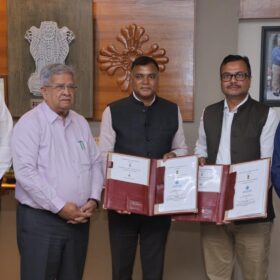India added 7 GW of renewable energy generation capacity during FY 2020-21’s first eight months leading to November end. That is 38% lower than 11.4 GW installed during the corresponding period (April-November end) last fiscal, according to a new report by Care Ratings.
Solar power accounted for 75% or 5.2 GW of the new capacity addition, taking India’s cumulative installed PV capacity to 37 GW as of November end.
“The lower capacity addition [during FY 2020-21] can be attributed to the lockdown led disruptions in the supply chain (which slowed movement of inputs and has led to an increase in their prices), labor shortages as well as the constrained finances and liquidity pressures faced by the developers. Besides, the restriction on the imports of inputs, viz, for solar power, has aggravated the constraints faced by the developers,” said Care Ratings analysts in the report.
Coal-based power, which is the nation’s dominant electricity source and accounts for 55% of the total power generation capacity, added just 1.9 GW to generation capacity in the eight months to November 2020.
Of the cumulative 374 GW domestic electricity generation capacity, renewable energy generation capacity stands at 90 GW (24% of the total).
Discom dues
The report said outstanding dues owed by DISCOMs to power generators have been mounting. As of November 2020 end, these amounted to INR 1.31 lakh crore, a 28% increase from April 2020.
The outstanding dues were the highest for the Discoms of Rajasthan (INR 40,229 crore), followed by Tamil Nadu (INR 21,825 crore) and Uttar Pradesh (INR 14,329 crore). These three states accounted for 58% of the total outstanding dues.
This content is protected by copyright and may not be reused. If you want to cooperate with us and would like to reuse some of our content, please contact: editors@pv-magazine.com.









4 comments
By submitting this form you agree to pv magazine using your data for the purposes of publishing your comment.
Your personal data will only be disclosed or otherwise transmitted to third parties for the purposes of spam filtering or if this is necessary for technical maintenance of the website. Any other transfer to third parties will not take place unless this is justified on the basis of applicable data protection regulations or if pv magazine is legally obliged to do so.
You may revoke this consent at any time with effect for the future, in which case your personal data will be deleted immediately. Otherwise, your data will be deleted if pv magazine has processed your request or the purpose of data storage is fulfilled.
Further information on data privacy can be found in our Data Protection Policy.